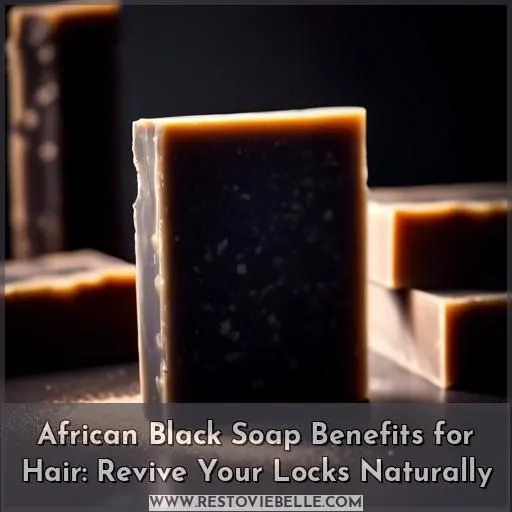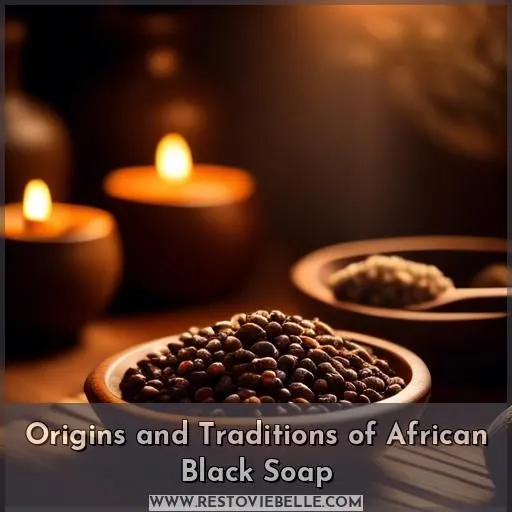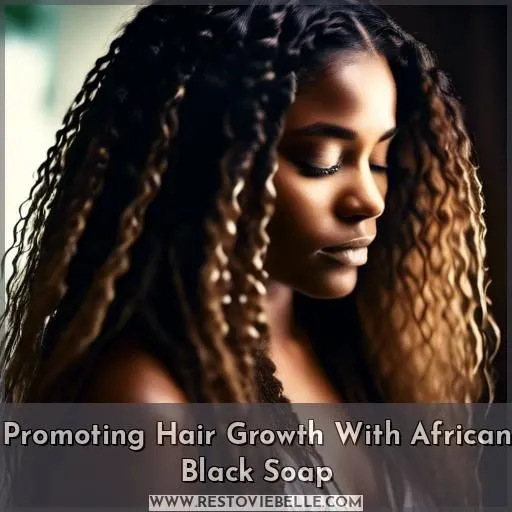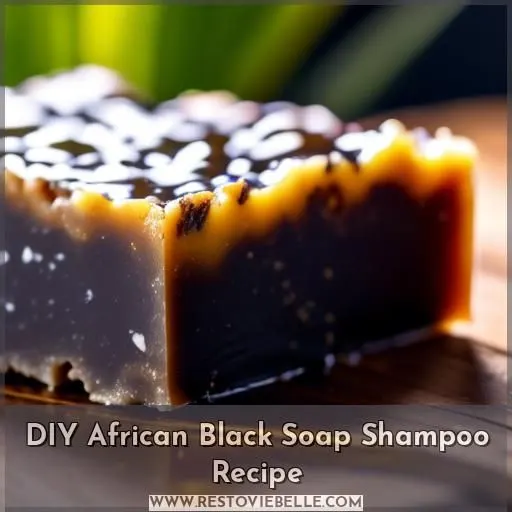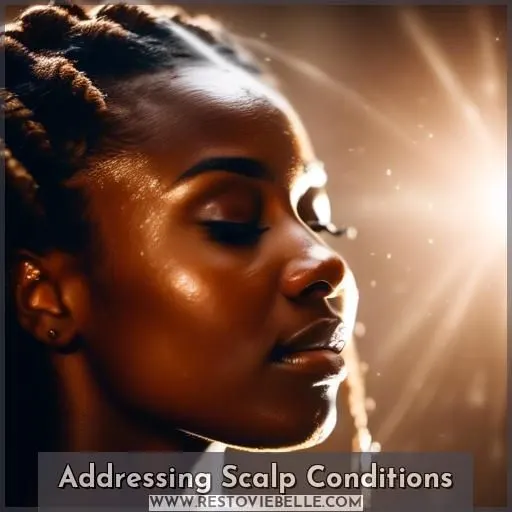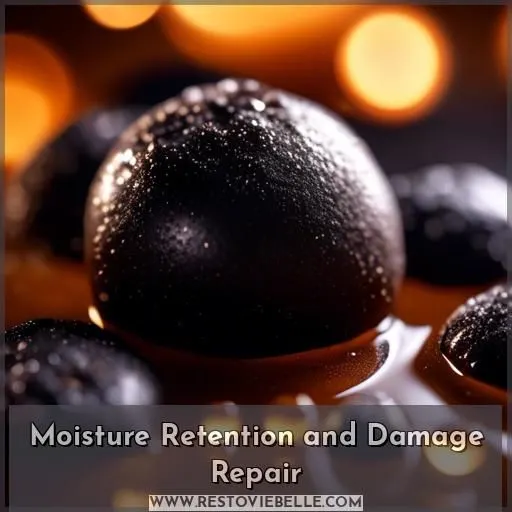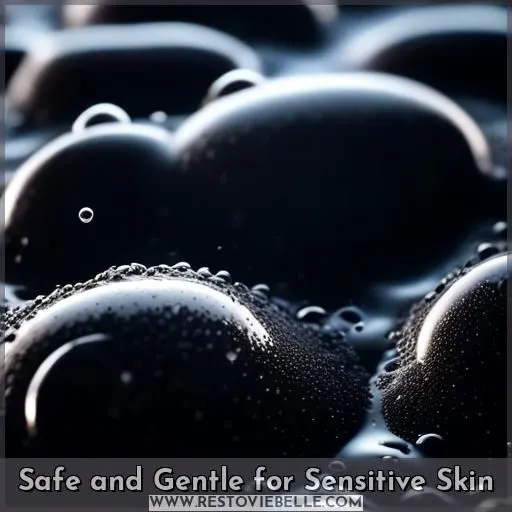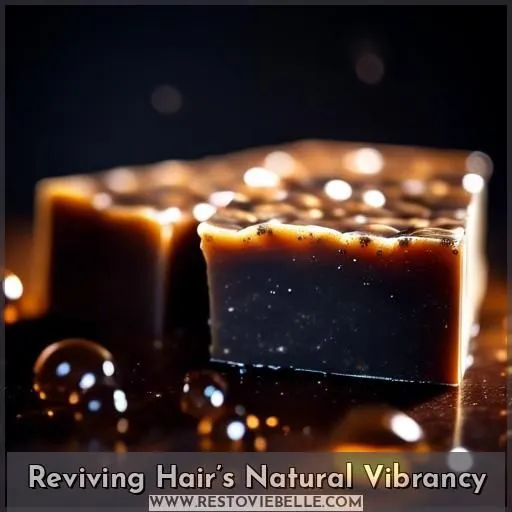This site is supported by our readers. We may earn a commission, at no cost to you, if you purchase through links.
African black soap’s antifungal and antibacterial properties combat harmful microbes, ensuring a clean, healthy scalp environment for your locks to thrive.
Its exfoliating action removes buildup while moisturizing effects nourish and seal in hydration.
Packed with shea butter, plantain extract, and vitamins A and E, it fortifies hair structure and stimulates growth from the root. You’ll enjoy thicker, healthier strands with enhanced blood circulation and nutrient delivery to follicles.
Its gentle, chemical-free formula addresses scalp woes like dandruff, eczema, and itchiness.
Experience the full restorative potential of African black soap for reviving your hair’s natural vibrancy.
Table Of Contents
- Key Takeaways
- Origins and Traditions of African Black Soap
- Comprehensive Benefits for Hair Health
- Promoting Hair Growth With African Black Soap
- DIY African Black Soap Shampoo Recipe
- Addressing Scalp Conditions
- Moisture Retention and Damage Repair
- Safe and Gentle for Sensitive Skin
- Reviving Hair’s Natural Vibrancy
- Frequently Asked Questions (FAQs)
- Conclusion
Key Takeaways
- African black soap’s antifungal and antibacterial properties combat harmful microbes, ensuring a clean, healthy scalp environment for hair growth.
- The soap’s exfoliating action removes buildup while moisturizing effects nourish and seal in hydration, promoting thicker, healthier strands.
- Packed with shea butter, plantain extract, and vitamins A and E, African black soap fortifies hair structure and stimulates growth from the roots.
- The soap’s gentle, chemical-free formula addresses scalp woes like dandruff, eczema, and itchiness, making it suitable for all hair types and supporting local communities and the environment.
Origins and Traditions of African Black Soap
African black soap has a rich history and cultural significance that dates back to the Yoruba communities in Western African countries such as Ghana, Togo, and Benin. This soap has been passed down from mother to daughter for generations and has been used for the health of the skin. The soap is made from natural ingredients like plantain skin ashes, palm oil, cocoa powder, and Shea tree bark, which are sun-dried and then burnt to produce ash. The ash is then mixed with water and various oils and fats like coconut oil, palm oil, and shea butter, and cooked for at least 24 hours. The soap is then scooped out and set out to cure for about two weeks until it takes the desired format.
African black soap has been traditionally used for skin (both face and body) and bathing, and it can come in a variety of different formats, each with different purposes and usages. It’s known for its nourishing and cleansing properties, and a number of benefits have been associated with its use, such as a lovely glow, antioxidant protection, soothing dry patches and irritated skin, and great exfoliating properties. It’s also great for removing makeup.
The soap has been used to treat various skin conditions, including acne, eczema, and psoriasis, and is known to be safe and free from harmful chemicals. It’s also eco-friendly and sustainable, as it’s made from locally sourced ingredients and supports local communities and the environment. The soap is suitable for all skin types and has become a popular toiletry product in North America.
Comprehensive Benefits for Hair Health
African black soap possesses remarkable antifungal and antibacterial properties that combat harmful microbes, preventing follicular infections and disruptions to the hair growth cycle. Its cleansing prowess extends to purifying the scalp, exfoliating away impurities and dandruff, while its moisturizing effects, courtesy of ingredients like shea butter, nourish and seal in hydration, preventing dryness and damage.
Antifungal and Antibacterial Properties
African black soap is a potent cleansing agent for your scalp due to its antifungal and antibacterial properties.
These benefits are essential for maintaining a healthy scalp, as they help fight scalp bacteria and fungus, which can lead to conditions like eczema, itchy scalp, dandruff, and even hair loss.
By using African black soap, you can gently remove dirt and impurities from your scalp while maintaining a natural pH balance.
This deep cleansing process can also disrupt the hair development cycle, preventing follicular rash and folliculitis.
The antifungal and antibacterial properties of African black soap play a significant role in promoting scalp health and preventing damage to your hair.
Enhances Scalp Cleansing
African black soap is renowned for its gentle exfoliating properties. It helps to remove dead skin cells and promote cell turnover. This gentle exfoliation can assist in fading hyperpigmentation by allowing fresh, healthy skin to emerge.
Additionally, African black soap is known for its ability to soothe the scalp. It provides relief from irritation and itching. Its gentle nature makes it an ideal choice for those with sensitive skin, as it doesn’t cause irritation or dryness.
Moreover, African black soap is effective in treating dandruff and other scalp conditions. It has antibacterial and antifungal properties that combat diverse skin bacteria and fungi. The soap’s natural ingredients, such as shea butter and cocoa butter, also provide deep hydration and nourishment to the scalp, promoting overall hair health.
Moisturizing Effects
African black soap is a natural ingredient that offers numerous benefits for hair health. Here are four key ways it can improve your locks:
- Moisturizing: African black soap is rich in vitamins and minerals that can be absorbed by your hair follicles, making your hair thicker and healthier. It also contains ingredients like shea butter, cocoa butter, and aloe vera, which help to moisturize the scalp and hair.
- Preventing Dryness: The soap’s ability to retain moisture is one of its most significant advantages. It prevents dryness by sealing in moisture and preventing breakage, resulting in healthier, more resilient hair.
- Treating Dandruff: African black soap has antifungal properties, making it effective in treating dandruff and other scalp conditions. It can help to exfoliate the scalp, removing impurities and promoting a clean, healthy environment for hair growth.
- Nourishing Follicles: The soap’s high nutrient content, including vitamins A and E, nourishes hair follicles, promoting faster hair growth. It also contains glycerin, which absorbs moisture from the air, further enhancing the moisturizing effects on your hair.
To experience these benefits, you can try making your own DIY African black soap shampoo using ingredients like warm water, African black soap, baomint oil blend, and your favorite essential oils. This homemade shampoo will both cleanse your hair and provide the nourishing properties of African black soap, leaving your hair thicker, healthier, and more radiant.
Promoting Hair Growth With African Black Soap
African black soap is a powerhouse for promoting hair growth.
It nourishes follicles with nutrient-rich ingredients like shea butter, plantain extract, and vitamins A and E, thereby fortifying the hair’s structure and stimulating robust growth from the root.
Additionally, the soap’s antioxidant properties enhance blood circulation to the scalp, ensuring the best possible delivery of essential nutrients that energize follicles and facilitate the development of thicker, healthier strands.
Nourishing Follicles
After exploring the myriad benefits African Black Soap bestows upon hair health, let’s anchor at the shore of follicle nourishment. This natural marvel, brimming with palm kernel oil and plantain skin ash, resembles a luxurious spa retreat for your scalp. It guarantees that your hair’s roots absorb all the nourishment, fostering hair growth and reversing the signs of hair loss.
Rich in Vitamins a and E
African Black Soap is brimming with vitamins A and E, making it a potent instrument for hair nourishment and follicular revitalization.
These vitamins bestow anti-aging attributes that safeguard your scalp and combat the signs of aging, such as wrinkles and acne.
They also shield your hair from free radicals, which can cause dryness and damage.
By incorporating African Black Soap into your hair care routine, you won’t merely foster hair growth but also sustain the inherent vigor of your tresses.
DIY African Black Soap Shampoo Recipe
You can create an invigorating, nutrient-rich shampoo using African black soap by blending shea butter, coconut oil, and essential oils with melted black soap and warm water. The lathering mixture, rich in vitamins A and E, gently cleanses the scalp, removes product buildup, and nourishes your tresses, leaving them vibrant and healthy.
Ingredients and Preparation
To create a DIY African black soap shampoo, you’ll need the following ingredients:
- Half a jar of warm water
- ⅓ to ½ bar of African black soap
- 3 teaspoons of baomint oil blend
- 1 teaspoon each of 3 favorite oils
Preparation:
- Fill a jar with half a jar of warm water.
- Cut the African black soap into shavings and add them to the jar.
- Add the baomint oil blend and other oils.
- Stir the jar to dissolve the shavings.
- Let the mixture sit for 1-2 hours.
Benefits:
This DIY African black soap shampoo offers a variety of benefits for your hair:
- Clarifies the scalp: African black soap is known for its ability to cleanse and purify the scalp, leaving it free from dirt, grease, and residue.
- Maintains natural pH: The soap helps maintain the natural pH balance of your scalp, ensuring optimal hair growth and health.
- Thickens hair: The vitamins and minerals in the soap can be absorbed by your hair follicles, making your hair thicker and fuller.
- Retains moisture: African black soap is rich in shea butter and cocoa butter, which nourish your hair and help it retain moisture.
- Reduces overdrying: The soap’s gentle cleansing properties prevent your hair from becoming dry or unhappy.
Application and Benefits:
Once your shampoo is ready, you can apply it to your hair and scalp. The benefits of using African black soap shampoo include:
- Scalp health: The soap’s exfoliating properties help remove dandruff and impurities, promoting healthy hair growth and curing scalp conditions like eczema and itchy scalp.
- Antifungal and antibacterial properties: African black soap is effective in removing harmful germs and fungi, preventing follicular rash and folliculitis and disrupting the hair development cycle.
- Hair growth enhancement: The soap promotes rapid hair growth by increasing blood flow circulation, transporting essential nutrients to the hair follicles, and energizing hair follicles.
- Moisture retention and damage repair: African black soap seals in moisture, preventing dryness and repairing damaged hair. It also shields your hair from UV radiation.
- Anti-aging benefits: The soap contains vitamins A and E, which support healthy circulation and prevent hair aging, thinning, and graying.
Application and Benefits
Crafting your own DIY African Black Soap shampoo is a breeze! With just a few simple ingredients and a butter knife, you can create a homemade concoction that offers numerous hair care benefits.
This shampoo is perfect for those seeking natural hair growth solutions and scalp treatments.
The African Black Soap, combined with palm oil and cocoa powder, provides antifungal and antibacterial properties, while also exfoliating your scalp.
It’s a gentle, chemical-free alternative to store-bought shampoos, making it suitable for those with sensitive skin or skin rashes.
By following the recipe and allowing it to sit for a few hours, you’ll have a nourishing shampoo that leaves your hair thicker, more moisturized, and your scalp clean and healthy.
Addressing Scalp Conditions
African black soap is a potent ally in addressing eczema and itchy scalp conditions. Its antibacterial and anti-inflammatory properties alleviate irritation, soothe the scalp, and prevent flare-ups. Additionally, the soap’s gentle exfoliating action dislodges buildup, flakes, and impurities, effectively combating dandruff and promoting a healthy, balanced scalp environment.
Eczema and Itchy Scalp Relief
Suffer from eczema or an itchy scalp? African Black Soap offers a gentle, natural solution. This DIY treatment is perfect for those with sensitive skin, as it’s free from harsh chemicals. Here’s how it works:
- Eczema relief: African Black Soap’s antifungal properties help fight eczema-causing fungi.
- Itchy scalp: Its exfoliating action removes impurities, calming itchiness.
- Gentle cleanser: Its mild pH balance makes sure no irritation occurs.
- Natural remedy: No more worrying about toenail fungus or athlete’s foot spreading to your scalp.
Dandruff and Impurity Removal
Dandruff removal isn’t just a dream; it’s a reality with African Black Soap.
Its anti-inflammatory properties dive deep, cleansing your scalp of impurities and banishing dandruff to the abyss.
This magical soap doesn’t stop there; it nourishes each follicle, strengthening your hair from root to tip.
Imagine your hair not just surviving, but thriving, free from the shackles of flakes and weakness.
Moisture Retention and Damage Repair
African black soap’s rich emollient properties create a protective shield around your hair strands, locking in moisture and preventing dryness. Its nourishing oils and butters deeply penetrate the hair cuticle, repairing damage caused by heat styling, chemical treatments, or environmental stressors, leaving your locks smooth, strong, and revitalized.
Preventing Dryness
African black soap is a natural ingredient that can help prevent dryness in your hair. It’s rich in vitamins and minerals, such as vitamins A and E, which can nourish your hair follicles and add nutrients to your scalp. By using African black soap in your hair care routine, you can maintain a healthy scalp and promote hair growth.
To use African black soap for moisture retention, you can dilute it with water and add essential oils or carrier oils to prevent dryness. The soap is known for its ability to soften and moisturize the hair, leaving it feeling healthy and hydrated. By incorporating African black soap into your hair care routine, you can avoid the dryness that can be associated with other shampoos and maintain the natural oils in your hair.
In addition to using African black soap, you can also consider using a sulfate-free, pH-balancing shampoo like Loving You by TLP, which combines African Black Soap, Rhassoul Clay, and Sea Kelp to gently cleanse your hair without stripping it of its natural oils. This shampoo is designed to have a rich lather and cleanse the hair and scalp without damaging your hair.
Repairing Damaged Hair
African Black Soap (ABS) is a game-changer in the realm of hair restoration. Its abundance of antioxidants and vitamins plays a pivotal role in:
Sebum Regulation: ABS effectively manages the sebum levels on your scalp, preventing both excessive and insufficient production, which can result in dry or oily hair.
Split End Reduction: The natural components of ABS, including shea butter and cocoa butter, collaborate to shield your hair from harm and minimize split ends.
Follicle Strengthening: ABS is a rich source of vitamins A and E, which are indispensable for robust hair growth. These vitamins bolster the hair follicles, rendering your hair more resilient and less susceptible to damage.
Safe and Gentle for Sensitive Skin
African black soap is a gentle and natural alternative for those with sensitive skin. Its non-irritating plant-based ingredients, free from harsh chemicals, provide a mild yet effective cleansing solution, making it a safe choice for even the most delicate scalps.
Non-irritating Ingredients
Embrace the soothing properties of African Black Soap, a gentle and non-irritating ingredient for your hair care routine. This traditional soap is easy to wash off, leaving no residue behind, and promotes hair growth by nourishing follicles with rich vitamins. With its safe and gentle nature, it’s perfect for those with sensitive skin or scalp conditions like eczema or itchiness.
Avoiding Chemical Additives
To avoid chemical additives in your hair care routine, consider using natural alternatives like African Black Soap. This soap is made from locally harvested plant ashes, and its recipes vary among tribes, making it a rich part of West African heritage and culture. By choosing African Black Soap, you’re opting for a product that’s free from synthetic chemicals, which can be harsh on your hair and scalp.
In addition to its natural origins, African Black Soap offers a variety of benefits for your hair. It’s antifungal and antibacterial, helping to treat and prevent fungal infections and combat diverse skin bacteria. This soap also cleanses your scalp, removing dirt, grease, and residue while enhancing scalp health. Also, it’s moisturizing, nourishing your hair with shea butter and cocoa butter.
For those with sensitive skin, African Black Soap is a safe and gentle option. It’s non-irritating, leaving no residue and promoting hair growth by nourishing follicles with natural oils. Its use can lead to thicker hair, hair that retains more moisture, a clean and healthy scalp, and hair that isn’t dry or unhappy.
If you’re looking to create your own hair care products, consider a DIY African Black Soap shampoo recipe. This recipe includes ingredients like warm water, African black soap shavings, baomint oil blend, and your favorite oils. By following this recipe, you can enjoy the benefits of African Black Soap while also customizing your shampoo to suit your preferences.
Reviving Hair’s Natural Vibrancy
African black soap’s nourishing properties can breathe new life into dull, lifeless hair. Its unique composition, rich in vitamins and antioxidants, helps to restore vibrancy, volume, and shine while combating the effects of aging on your strands.
Restoring Volume and Shine
After soothing your sensitive scalp, let’s explore how African black soap transforms dull locks. Here’s your strategy:
- Boost Hair Porosity: It aids your hair in absorbing vital moisture.
- Enhance Hair Elasticity: Bid farewell to breakage and welcome resilient strands.
- Combat Hair Loss: Nurtures the scalp, anchoring those follicles firmly.
- Soothe Scalp Irritation: A serene scalp fosters joyful hair growth.
Anti-aging Benefits for Hair
African Black Soap offers a wealth of anti-aging benefits for your hair.
It can help prevent hair aging, thinning, and graying by strengthening hair structure and containing anti-aging substances.
The soap’s natural ingredients, such as shea butter and vitamins, support healthy circulation and nourish follicles.
This promotes rapid hair growth and reduces the appearance of gray hair.
By using African Black Soap regularly, you can revive your locks and restore their natural vibrancy.
It gives you a sense of liberation and mastery over your hair’s aging process.
Frequently Asked Questions (FAQs)
Can African Black Soap be used on all hair types?
Yes, African Black Soap‘s versatility allows it to benefit all hair types. Its gentle cleansing, nourishing oils, and scalp-purifying properties make it a universal ally for healthy, vibrant tresses – no hair left behind!
How long should I leave African Black Soap on my hair before rinsing it off?
A whopping 84% of naturals swear by leaving African Black Soap on for 5-10 minutes before rinsing. This allows the soap’s nutrients to deeply penetrate strands, maximizing moisture retention and growth stimulation – a win-win for your glorious crown!
Can I use African Black Soap if I have a sensitive scalp?
You betcha! African black soap is gentle and suitable for sensitive scalps. Its natural ingredients soothe irritation while providing nourishing botanical benefits. Just do a patch test first to make sure your scalp loves it as much as you will.
Can African Black Soap help with hair loss?
You’re battling hair loss? Don’t lose your mane to that dastardly villain! African Black Soap is your secret haircare weapon – its nutrients reinvigorate follicles, reducing shedding and sparking new growth.
Can I use African Black Soap as a shampoo or should I add oils to it?
You can definitely use African Black Soap as a shampoo straight up! But adding oils supercharges the moisture, shine, and manageability. A custom blend lets you target your hair’s unique needs – dry ends, flaky scalp, you name it. Get creative and make it yours!
Conclusion
Coincidentally, if you’re seeking a natural solution to revitalize your locks, African black soap benefits for hair are undeniable.
Its antimicrobial properties create a healthy scalp environment.
While exfoliating impurities and sealing in moisture.
Enriched with vitamins and emollients, it stimulates growth from the roots.
Promoting thicker, shinier strands.
Embrace this gentle, chemical-free remedy to experience your hair’s full vibrancy without compromising its integrity.

